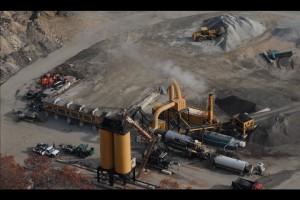 For neighbors living near two asphalt plants in Coventry, it is a steady drumbeat of sounds six days a week, eight months out of the year.
For neighbors living near two asphalt plants in Coventry, it is a steady drumbeat of sounds six days a week, eight months out of the year.
The sound is of materials being delivered, asphalt being mixed and trucks hauling the finished product along a narrow residential road dozens of times every day.
“It’s horrible. It’s absolutely horrible,” says Charlotte Porter, who moved to Westwood Estates, a development of more than 400 homes, three years ago. She and her husband arrived after the asphalt plants finished production for the season.
“Around the end of March, beginning of April, this foul smell came. It was unbelievable,” she said. “I had to shut my windows. I didn’t know what it was. Nobody ever mentioned asphalt plants.”
Porter said if the real estate agent said something, they never would have bought their house, which is only several hundred feet from one of the plants, separated by a line of tall trees. Porter, who now has breathing problems, is part of a group that wants to see the plants shut down or relocated even though they and several other operations have been there for decades.
Town council president, Gary Cote, has taken much of the heat from the citizens group, but throws responsibility right back on the homebuyers. “Shame on whoever bought those properties for not doing their due diligence in knowing what was in the area,” Cote said. “Because if I didn’t want to live next to an asphalt plant, I certainly wouldn’t buy a home within a half to three-quarters of a mile of an asphalt plant.”
The group responds that of course residents knew there were businesses in the 50-acre industrial area, but the town allowed the asphalt plants to expand and change significantly without any citizen input.
Cote rejects the neighbors’ claims that the two plants were a much different operation when they bought their homes, or that the town allowed an illegal expansion.
Deb Bacon, a leader in the citizens group, had a hard time finding paperwork for the approvals. “When a business comes into the town, you go before the planning board, you go before town council,” Bacon said. “We’re trying to find that paper trail with the asphalt plants back there, and it’s very difficult to find. We were told there was a flood and all of the documents were destroyed.”
Tom Miozzi bought one of the two asphalt plants in 2004. He gave us a tour last month, talking about the efforts he’s made to help reduce the effects his operation has on the surrounding neighborhood. Miozzi reduced the temperature of the asphalt mix from 325 degrees Fahrenheit to about 295, which helps prevent boiling off of some of the oil. That, in turn, reduces the blue smoke and odor some residents have complained about.
The plant is allowed to operate weekdays 7 am to 7 pm, until 5 on Saturdays and is closed Sunday.
Miozzi says he sympathizes with the neighbors’ complaints, to a point. “There are some who are definitely justified. Others who file a complaint and the wind direction is in the complete opposite direction of the residence may be fraudulent,” he said.
Tammy Duxbury, the head of the citizens group, says the state Department of Environmental Management also dropped the ball. “Whenever they come down here, it’s four hours after the complaints are filed or on days that we haven’t had any complaints filed and they don’t smell the odor. DEM points to the town, the town points to DEM and in the middle of this are the residents and the people who live there who are trying to address their quality of life.”
Miozzi says he’d be willing to move, and suggests the town should have a long-term plan to relocate the other operations there as well. But it will come at a cost. He estimates $1 million for his plant alone. “Find us another home where we’re surrounded by commercial or light industrial. I think we should solve the problem one piece at a time.”
That is something Duxbury agrees with. “Our organization wants to see them relocated and we wanted to see that industrial park rezoned. Our hope is to have it rezoned to open space. Those asphalt plants and any industrial businesses down there simply do not belong there.”
Bacon said moving to Coventry has been a nightmare. “I lived in Warwick right next to the airport. We left Warwick to come to Coventry to get away from the air pollution. And apparently I’ve jumped from the frying pan into the fire. I should have stayed in Warwick. I knew what I was dealing with there.”
The Hummel Report is a 501 3C non-profit organization. If you have a story idea or want make a donation to the Hummel Report, go to www.hummelreport.org. Or mail Jim directly at jim@hummelreport.org.